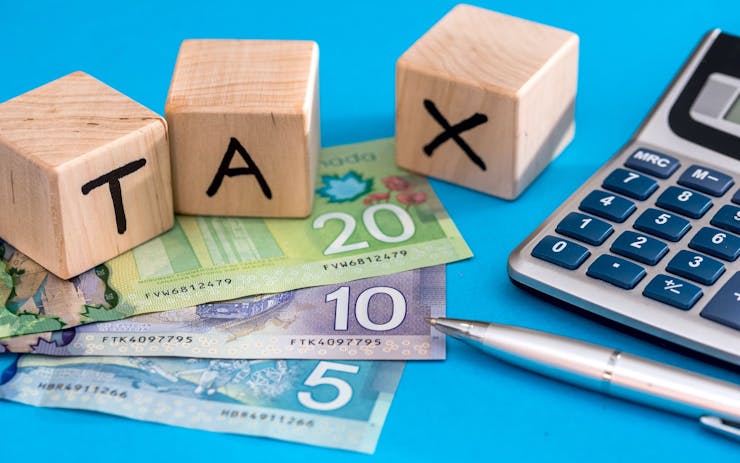*This article was last updated on April 12, 2022.
Like last-minute Christmas shopping, preparing the taxes is an annual source of stress for Canadians, many of whom spend every April awash in a sea of receipts.
Right now, millions of people are scratching their heads, trying to figure out which expenses they can claim. That includes hundreds and thousands of medical cannabis patients.
It’s worth the effort.
The federal government recognizes prescribed cannabis as a medical expense so, if you’re a registered patient, claiming it on your tax return could reduce the amount of taxes you owe.
It could even help put money back in your pocket depending on your income. If a portion of your medical cannabis costs is covered by a private health insurance plan, you could still claim the portion that isn’t
Step one: Do you have a medical marijuana card?
In Canada, patients hold a medical cannabis authorization, similar to a prescription, from a doctor or licensed healthcare professional. Unlike the US, patients north of the border do not have a physical “card” to use in dispensaries, they must order from a licensed seller of medical cannabis products.
If the authorization has expired during the tax year (2021), you can claim expenses for the time period during which it was valid. You should also have proof of registration with a licensed seller, most often a document the seller sends when you register and includes a patient ID.
Step two: Gather documents and purchase receipts
Next, gather your receipts and supporting documentation. This means all your medical cannabis receipts for 2021 or for any 12-month period that ended during that year.
Shop highly rated dispensaries near you
Showing you dispensaries nearYou may be able to claim some expenses from 2020 if you haven’t already done so. Add the total amount to any other allowable medical expenses you are going to claim on your tax return.
Use receipts only for expenses that can be claimed including medical cannabis (dried flower, concentrates, extracts, edibles, oils, etc) and cannabis plant seeds purchased for medical use.
Good to know: You can’t claim expenses related to growing and producing medical cannabis for personal use. Those items include soil, pots, lights, etc.
You can also claim certain accessories such as Health Canada-approved vaporizers that are used to consume cannabis; they are considered medical devices. Only a handful of devices are eligible so you should check with the Canada Revenue Agency.
As with other areas of tax filing, keeping good records is important. To claim medical expenses, you don’t have to include attachments of all medical records when you file. However, you should definitely keep all receipts for the expenses and any prescriptions in case of a future audit.

Step three: Get your calculator (or accountant)
You can claim as a non-refundable tax credit your total eligible medical expenses minus three percent of your net income or $2,397, whichever amount is less.
In the case of couples, it is generally beneficial to have the lower-income spouse claim medical expenses because that allows for more eligible expenses. Medical expenses for dependents can also be claimed.
Medical expenses can be claimed as a non-refundable tax credit, which is only valuable to you if you have tax payable that you can offset it against. However, if you’re employed but have low income and high medical expenses, you may be eligible for the Refundable Medical Expense (RMES) supplement. You can find more information here.
Note: You cannot claim both the non-refundable tax credit, known as the Medical Expense Tax Credit (METC) and the RMES.
Q&A with Glenn Fraser, co-leader of MNP’s cannabis services team.
*interview took place in 2020, prior to the update of this article.
Leafly: According to the Canadian Revenue Agency, if you have a prescription for cannabis (i.e. a medical document) you can claim the amounts for cannabis, cannabis oil, plant seeds, or related products purchased for medical purposes. Does this mean you can claim accessories such as vaporizers, pipes, etc?
Glenn Fraser: The short answer is yes. Some additional items that you can claim include edible cannabis and topicals. In addition, accessories such as rolling papers or wraps, holders, pipes, water pipes, bongs and vaporizers can be eligible if they are used to consume cannabis for medical purposes.
How much can an individual claim?
Fraser: You can claim your total eligible medical expenses, minus three percent of your net income or $2,352, whichever amount is less.
Medical expenses are a non-refundable tax credit, so a claim is only valuable to you if you have federal or provincial tax payable against which to offset it.
However, I understand that, in certain cases, you may be able to claim the refundable medical expense supplement. What should we know about that?
Fraser: Essentially, the Refundable Medical Expense Supplement (RMES) is applicable to individuals with low income and high medical expenses.
It is a refundable credit of $1,248 or 25 percent of your medical expenses, whichever amount is less. The RMES is reduced by five percent of your net income that exceeds $27,639. So, if your net income is $37,639, the RMES is reduced by five percent of $10,000. That amounts to $500.
To be eligible, you must be a Canadian resident throughout the year and be at least 18 years old at the end of the year. You must also have a net employment or self-employment income of at least $3,645. Also, your net income cannot be higher than $52,599.
What tips could you offer medical cannabis patients when it comes to filing taxes? What information might they find especially useful?
Fraser: As with all other areas of tax filing, keeping good records is always important. To claim the medical expense described above, you don’t have to include attachments of medical records when you file. However, you should definitely keep all receipts for the expenses and any prescriptions in case of a future audit.





